For anyone sensitive to mosquito bites, asking if there are mosquitoes in Fuerteventura is a fair question if you plan to visit the island. I am sorry to disappoint you. There are.
However, please don’t worry; although they are found here, they are not a massive problem as they can be elsewhere.
Mosquitoes can be found in Fuerteventura almost any time of the year, but never in great numbers. This is mainly because there is little standing water, which mosquito larvae need to develop.
This is fortunate for those living in Fuerteventura or visiting for holidays but it is often not the case with many other relatively hot countries. The island is different for the reasons below.
Table of Contents
Fuerteventura mosquito season
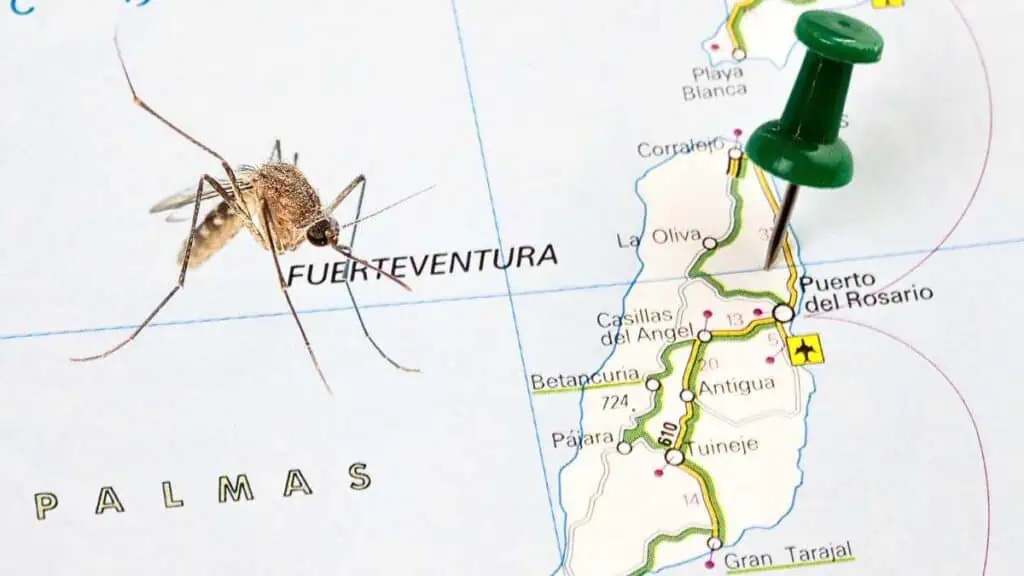
There is no definable mosquito season in Fuerteventura. Potentially, if we have lots of rain in the winter, the mosquitoes could breed easier in the puddles and other areas of water that would exist (for a while, anyway), but I haven’t really noticed a significantly higher number in the rare times that we have had an appreciable amount of rain.
My perception of the Fuerteventura mosquito season is that perhaps there seem to be slightly more in the warmer months of the year, but that is hardly significant.
However, I have asked some of my friends here when they think mosquito season is, and their opinions vary—some say in the winter, while others say in the summer. There aren’t many at any time of the year, so no one can say there is a Fuerteventura mosquito season.
The only sure thing is that the mosquitoes in Fuerteventura are generally more active in the evening and at night than during the day.
The last time I can remember having to kill more than the odd one or two in my bedroom before I went to sleep was in November 2018. So perhaps I could say that November is the worst month for mosquitoes, but I can’t say it is ever that noticeable, and that certainly hasn’t been the case in November 2019 or any November since then.
Oddly, one of Google’s most frequently asked questions about mosquitoes is, “Are there mosquitoes in Fuerteventura in February?” I do no know why that should be asked much more than any other month. The answer, of course, is, just like any other month – yes, but not very many.
Why aren’t there many mosquitoes in Fuerteventura?
There are two reasons why there aren’t too many mosquitoes in Fuerteventura.
- Part of a mosquito’s life cycle is its larvae stage. At this stage, mosquitoes live in water for around 10 days, often in ponds, ditches and stagnant water. Because Fuerteventura gets little rainfall, very little water sits for any length of time. Even when we get rain in the winter, water doesn’t last very long before it either soaks away or evaporates. So, mosquitoes have little chance to develop from the larvae stage to the next stage.
- Mosquitoes find it hard to locate hosts to bite when wind is greater than 10mph. One of the advantages of Fuerteventura being a windy island is that it is often above this speed, so it keeps them at bay. Of course, mosquitoes that manage to find their way into a house or hotel room will not have any wind to deal with then.
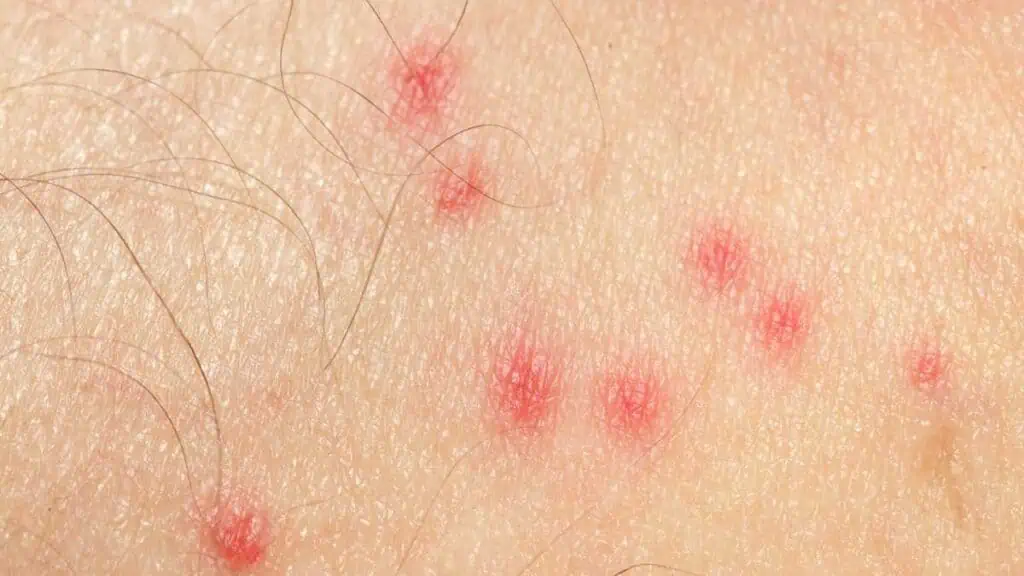
Mosquitoes can be a nightmare, particularly for some people, who end up with huge red swollen bumps all over themselves after being bitten. Reacting to mosquito bites even has a name, Skeeter Syndrome.
I am one of those lucky people who either doesn’t get bitten by mosquitoes or doesn’t react to them (1 in 10 humans, apparently). I remember being on holiday with my ex-wife many years ago and, as it was really hot, we both slept on top of the bed without clothes on, leaving the window open. In the morning, she had 40-50 big bites all over her body, and I had nothing.
But that said, I still absolutely hate mosquitoes! Although I don’t get bitten, I am a very light sleeper and whenever a mozzie flies by my ear, it wakes me up. I then have to get up, turn the light on, grab the fly swat and hunt for her (and they are the females who do this and which bite). If I can’t find the annoying creature, I have to give up and go back to bed but then I lay awake listening out for it.
Fuerteventura mosquitoes scaremongering

Although mosquitoes can carry some pretty nasty things, such as dengue fever, yellow fever, malaria, and the West Nile and Zika viruses, the mosquitoes in Fuerteventura do not.
Back in December 2017, the British press did what it does best by publishing false, ridiculous, scare-mongering articles about mosquitoes carrying dengue and yellow fever that had been discovered in Fuerteventura. This was false and designed to cause fear and sell their stupid newspapers.
These were two such irresponsible articles written by the scumbags in the British press:
- Daily Express – Canary Islands yellow fever outbreak: Is Brit holiday spot Fuerteventura a disease risk?
- The Sun – YELLOW WARNING Canary Islands holiday hotspot Fuerteventura faces outbreak of deadly yellow and dengue fever as swarm of disease-carrying mosquitoes descends on island
Are there mosquitoes in Lanzarote, Gran Canaria or Tenerife?
Perhaps unsurprisingly, the same situation applies to mosquitoes in Lanzarote, Gran Canaria and Tenerife, too.
Mosquitoes are present in the other islands at certain times of the year, although they are not normally a major concern. They do not carry threatening diseases, but their bites can be irritating.
How to avoid being bitten by Mosquitoes
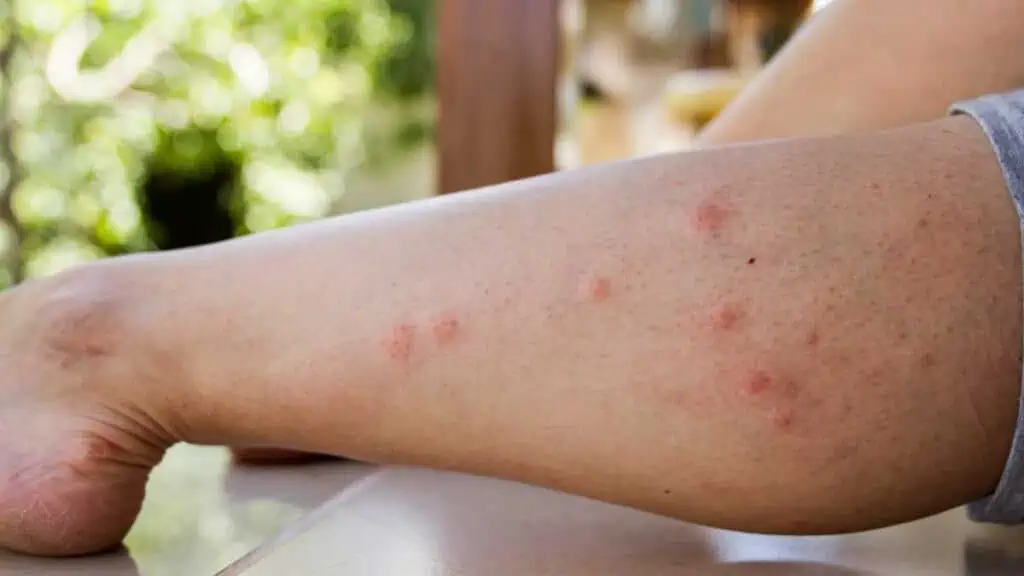
Although there are not many mosquitoes in Fuerteventura, if you are susceptible to being bitten and react badly to them, it would be sensible to take precautions.
There are probably hundreds of old wives tales about how to stop mosquitoes from biting. Some of these have some merit, and many do not.
Mosquito Repellents
DEET is the ingredient that seems to give the most effective protection in mosquito repellents. The most popular on Amazon that contains it is the Pyramid Trek 50 Insect/Mosquito Repellent Deet Spray.
If you prefer natural products, then the Incognito Insect Repellent Spray 100ml (Natural, DEET free formula) has many good reviews.
Although it is a skin softener and not a mozzie repellent, I have heard many times that members of the British armed forces use the Avon product “Skin So Soft” when they are in the jungle or in other places where mosquitoes and other biting insects are likely to be. It always makes me smile to think of tough SAS soldiers rubbing Skin So Soft on, but if it works, then why not? My wife has certainly used it successfully.
Skin So Soft can be bought on Amazon if you want to try it and bring some out here.
Other ways to prevent being bitten
Numerous ways are suggested, but the most popular appear to be:
- Spray the bedroom with mosquito killer spray before going to bed. This is something my wife likes to do, but I hate it. I don’t think breathing in the remnants of that insecticide all night is good for you in the long term, anyway.
- Vitamin B1 – taking large quantities is supposed to produce a skin odour that flying insects, particularly mosquitoes, don’t like.
- Lemon eucalyptus – often found in natural mosquito repellents
- Catnip oil – nepetalactone is the essential oil found in catnip and is supposed to be effective as a mosquito repellent
- Peppermint oil – this can be sprayed on the skin to deter mosquitoes
- Lemongrass oil – diluted it can be used in a spray, but it can be an irritant to some people
- Use an electric fan (as they don’t like the wind)
- Citronella candles (lemon is something of a theme to get rid of mozzies)
What to do if you get bitten
Don’t scratch them – no matter how much you may want to. This could lead to infection.
According to Webmd you should:
- wash the area with soap and water
- put calamine lotion on to soothe the skin and reduce itching
- Put an ice pack on the bite
- Take an over-the-counter antihistamine
Here in Fuerteventura, many recommend Fenistil, an antihistamine cream that you can get in any pharmacy on the island. Just speak to the Pharmacist (many speak English).
Are there any dangerous animals in Fuerteventura?
There are no dangerous animals or insects in Fuerteventura, apart from some in Oasis Park Zoo.
Fuerteventura has no scorpions or other harmful, poisonous insects or other animals. There may be the odd man-eating rabbit, though!
The only dangerous creature living in Fuerteventura is man.
Are there cockroaches in Fuerteventura?
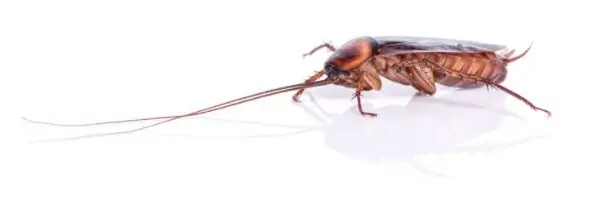
In common with most places in the world that are fairly hot, Fuerteventura does have cockroaches. Frankly, no matter where you go in the world, you will likely see the odd cockroach around if you want warmth on your holiday.
Generally, they are not a big problem here in Fuerteventura or the Canary Islands. You probably won’t see more than the odd one scuttle across a pavement in front of you, particularly in the evening, or perhaps the odd squashed one. That is if you see one at all.
If you find any in your hotel room or apartment, mention it to the management, and they will probably do something about it. You could also buy a cheap cockroach killer spray in one of the local supermarkets.
Are there spiders in Fuerteventura?
There are spiders in Fuerteventura, but nothing large and hairy. Most are so small that you are unlikely to see them. I get the odd small cobweb around my house, but I hardly ever see the spider that made it.
A tiny, white spider is unique to Fuerteventura and lives in a lava cave in Villaverde.
Are there snakes in Fuerteventura?
There are no snakes in Fuerteventura, apart from those that may be in Oasis Park Zoo (and I didn’t see any when I went there).
Some snakes exist in Gran Canaria and have bred from a pair of pet snakes that were stupidly released into the wild by an irresponsible owner.
Things you may see
Geckos
I love geckos. You may see them at night on walls, particularly near outside lights, where they wait patiently to catch flies or moths attracted by the light. Occasionally, you may get one on the wall inside your hotel room or apartment, although this is uncommon. If you do, leave a door or window open and they will find their way out.
They are completely harmless creatures. Please don’t try and pick one up as they may drop their tail in the panic to get away (a survival technique) and, although it will regrow, it takes much of their energy to do it.
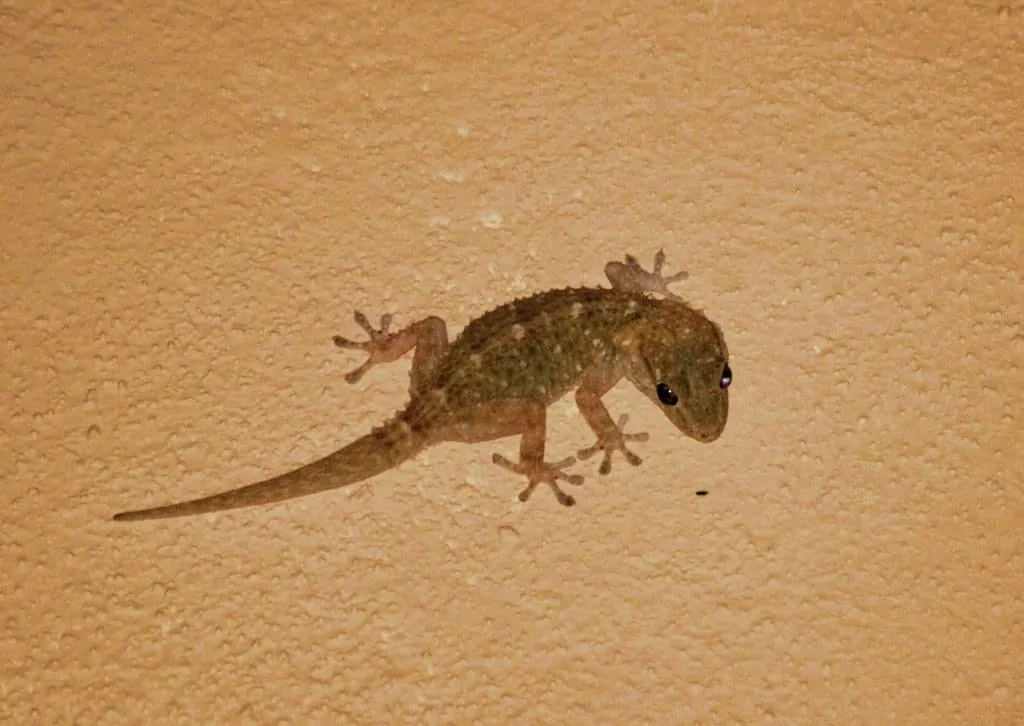
Lizards
You will probably see lizards in gardens or among rocks on much of the island. Even if you don’t see them, you may hear them as they scamper away to safety as you walk by. They are never very large and are completely harmless (unless you are a fly, of course).
If you see any among the rocks of a stone circle when you are lying in one on the beach, and you have something like an apple or orange with you, then put a piece on the rocks for them. They will be grateful for the moisture.
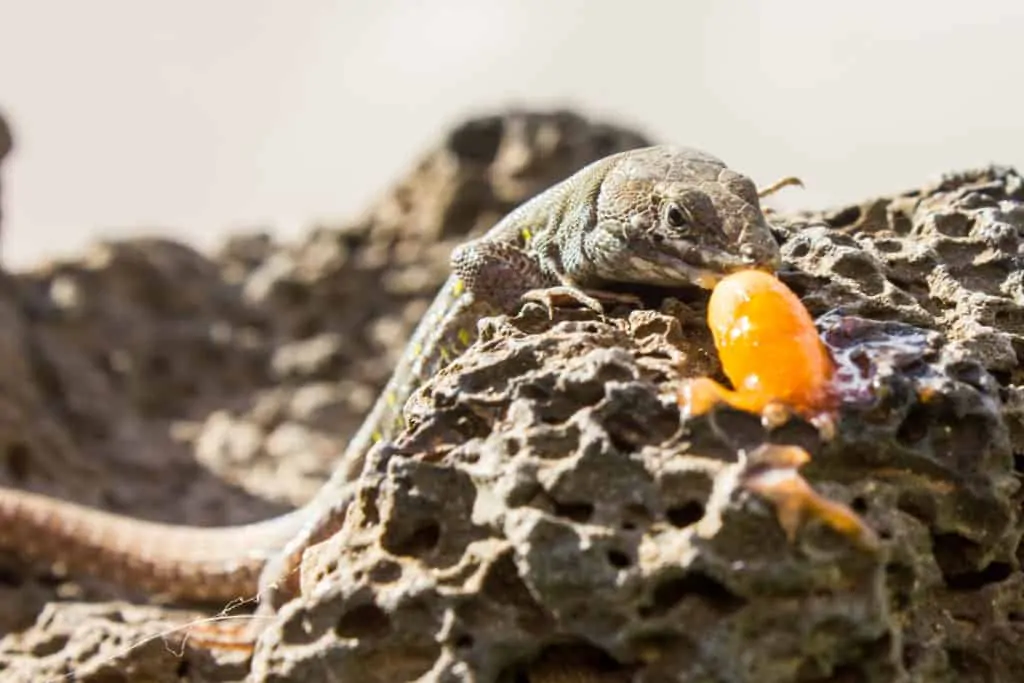
Praying Mantises
I occasionally see a praying mantis on the rocks in my garden and a few on the rocks of one of the stone sun-bathing circles on the beaches. They are harmless creatures and fascinating to watch with their slow, jerky movements.
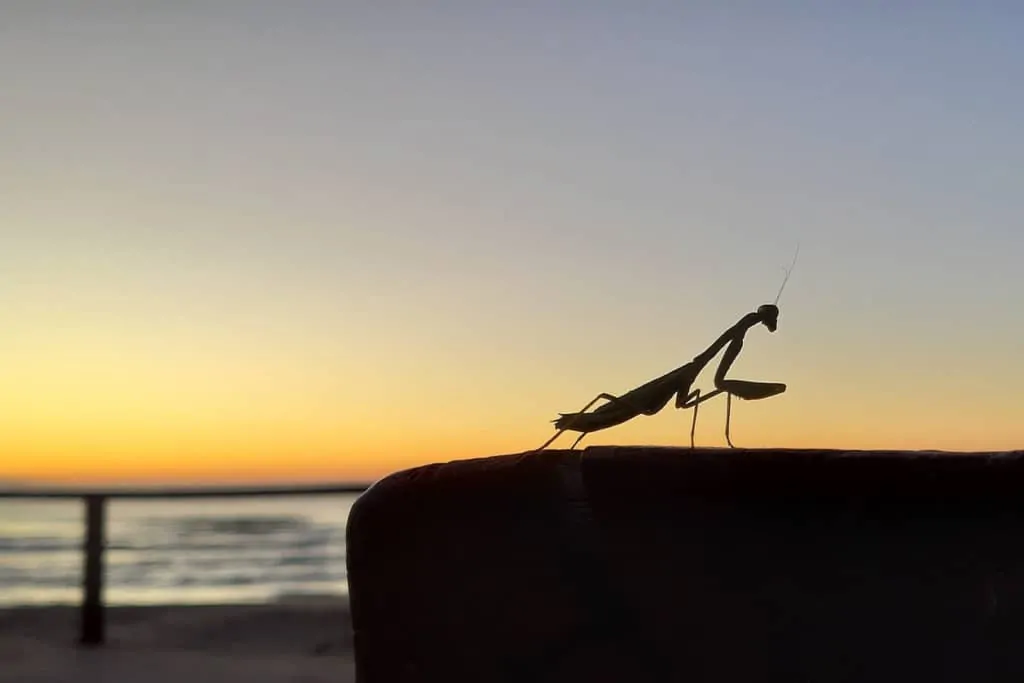
Summary
Fuerteventura, one of the stunning Canary Islands, is known for its beautiful beaches, clear blue waters, and warm climate, but concerns about mosquitoes and insects may arise for some travelers. However, rest assured that Fuerteventura is relatively free from mosquitoes and other pesky insects.
Fuerteventura’s unique climate and geographical characteristics significantly minimize the presence of mosquitoes. The island enjoys a warm and arid climate, creating an unfavorable environment for mosquitoes to thrive. With its low humidity levels and refreshing ocean breezes, Fuerteventura naturally discourages the proliferation of mosquitoes.
Fear not for those worried about encountering insects in Fuerteventura, as the island boasts an incredibly diverse ecosystem. While there are undoubtedly insects present, they tend to be of the harmless and non-annoying variety. Exploring the island’s natural beauty and wildlife, you may come across fascinating insect species that are intriguing to observe rather than bothersome.
Other articles
The Barbary Ground Squirrels of Fuerteventura – Fuerteventura Chipmunks
Is it always windy in Fuerteventura?
The big Calima in Fuerteventura in 2020
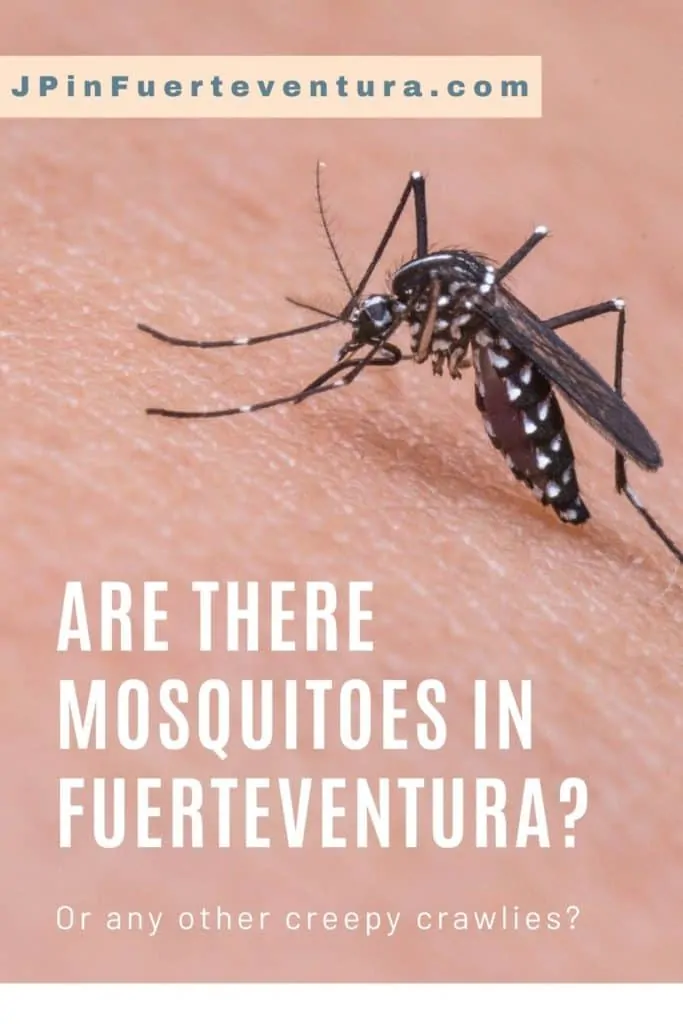
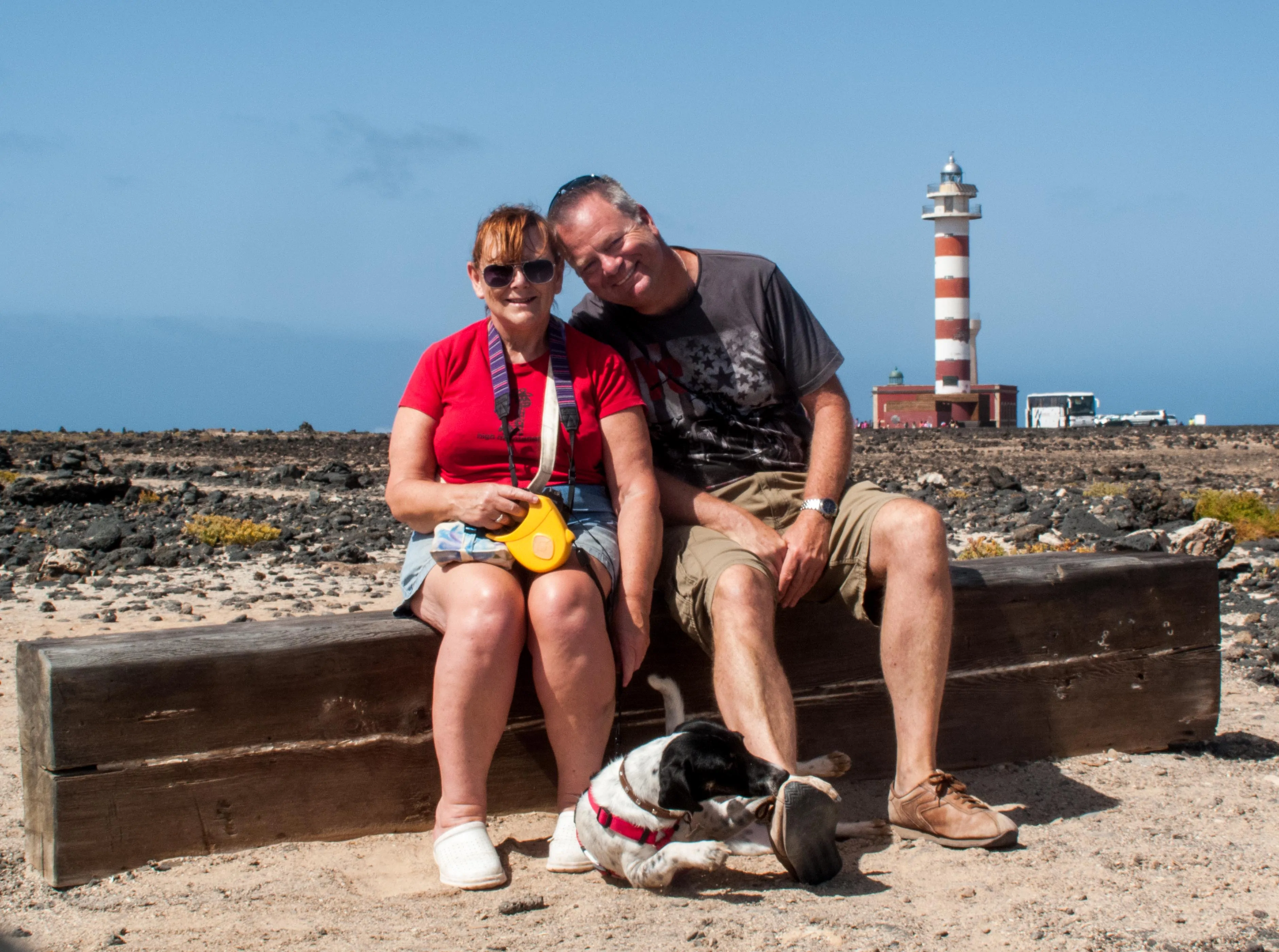
I have been holidaying in Fuerteventura for over 30 years and have been living here full time since 2013. I have a popular Youtube channel related to this website called JP in Fuerteventura




Leave a Reply